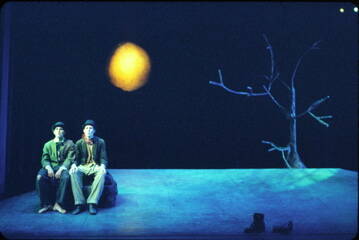They’re waiting. And that’s all that they do. They wait. And they wait. They talk while they wait. They sing some. They dream. They even dance a bit, as they continue to wait. When Estragon suggests that they depart, Vladimir reminds him. “We can’t.”
“Why not?”
“We’re waiting for Godot.”
Samuel Becket’s play is perhaps the most famous parable of the twentieth century. And it is a parable, not an allegory. Assign whatever significances you like. Say that this stands for that, but don’t miss the point of the parable. Didi and Gogo, as they call each other, simply wait for Godot. They do nothing else in Act I, and they do the same in Act II. As Estragon puts it, “Nothing happens, nobody comes, nobody goes, it’s awful.”
Towards play’s end, Vladimir says, “We are not saints, but we have kept our appointment. How many people can boast as much?”
Estragon wryly answers, “Billions.”
Waiting for Godot captures the essence of Advent and of liturgy itself: to wait upon the Lord. Advent doesn’t begin as a preparation for Christmas. That comes later. Advent begins as a reiteration of our common humanity. We Christians would say of our shared discipleship. We wait upon the Lord, wait upon a God, who entered in history, to act again. Non-believers can’t name that for which they wait. They simply watch, in hope, for a better tomorrow. Either way, billions wait.
Christians come to liturgy to talk, to sing, perchance to dream, even to dance a bit, but, essentially, we come to wait. It’s longing alone that links a stark, almost silent Quaker Prayer Meeting to the effusive splendor of an Orthodox Divine Liturgy.
Sometimes Christians compare their worship, within denominations and between them:
You talk too much.
You dance and gesture excessively.
We don’t sing well.
Of course there’s good reason to get the singing and talking and gestures right, as good as talent and grace will allow, but liturgy isn’t entertainment; it isn’t an ecclesial pep rally; and it’s not catechesis.
Liturgy is what the angels do in heaven. The scriptures call them “the watchers.” Like Advent, liturgy is an attending, a waiting for the promises of the Lord to be accomplished.
In Catholic Christianity, there is a reason that we speak of a “Liturgy of the Hours,” a daily, weekly, and annual cycle of psalms and prayers. We fill time with expectation. Or that the summit of the liturgical year occurs the night before Easter, when many complain, “These readings will take all night!” That’s what they were designed to do: to fill the hours of the night, to take our time on earth and to lift it into eternity. On the eve of every Sunday the Church sings Psalm 134, “Lift up your hands to the holy place and bless the Lord through the night” (1-2).
The Lord Jesus told us:
The opening line of Waiting for Godot is repeated numerous times in the play. “Nothing to be done.” It captures the spirituality of liturgy, of our way of praying within it. It is the way of Advent, the way of the angels. It is, in a word, to wait. It helps to know what we’re doing in liturgy, what we’re not attempting to accomplish. Nothing needs to be done by us. All has been accomplished in Christ. Just watch. Listen. Take it in and ponder.
Yes, there’s a listening, a talking, a singing, and a bit of dance, but essentially, we wait. We nurse the promises, ponder their meaning, and attend their fulfillment. Nothing alters in the world while we are at liturgy. It’s we who change. Liturgy leavens us for the world.
- Do this in memory of me
- Remain awake.
- Watch and pray.
- Thy Kingdom come. Thy will be done.
- We proclaim your death, O Lord, and profess your resurrection until you come again.
- I look forward to the resurrection of the dead and the life of the world to come.
- Deliver us, Lord, we pray, from every evil, graciously grant peace in our days, that, by the help of your mercy, we may be always free from sin and safe from all distress, as we await the blessed hope and the coming of our Savior, Jesus Christ.
It all comes back to this: to wait upon the Lord. The promise has been made. And now, we wait.
Jeremiah 33: 14-16 1 Thessalonians 3:12-4:2 Luke 21: 25-28, 34-36








